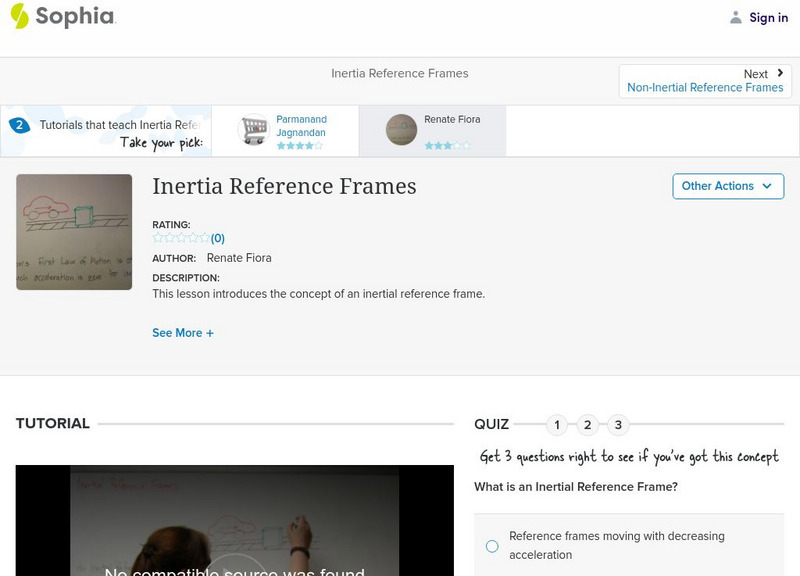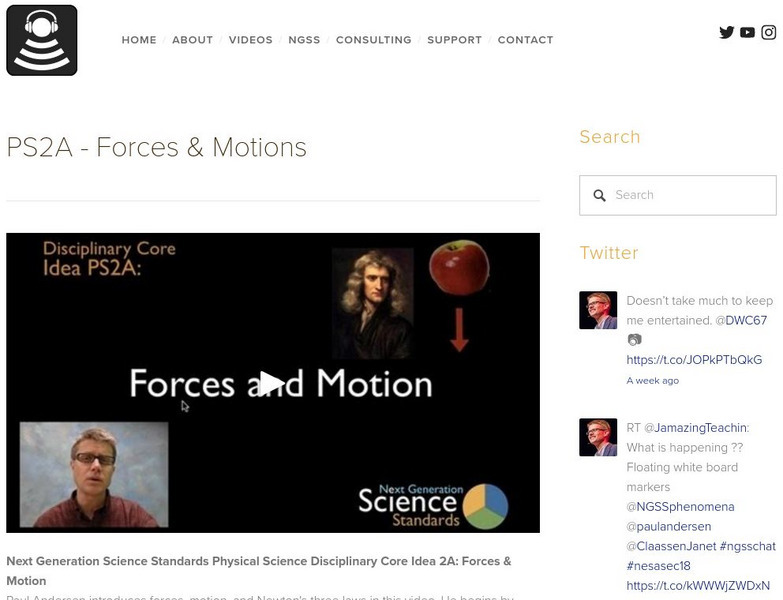Hi, what do you want to do?
BSCS Science Learning
Bscs: Forces and Motion: What Caused the Objects We Tested to Move?
This video shows a teacher supporting students in summarizing and synthesizing their ideas after experimenting with moving objects. [2:41]
BSCS Science Learning
Bscs: Forces and Motion: Experimenting With Different Forces Applied to a Chair
This video shows students involved in an activity in which they are pushing a chair with a weak, medium, and strong force, and using arrows to represent the size and direction of a force. [3:11]
BSCS Science Learning
Bscs: Forces and Motion: Using Different Objects to Probe Student Ideas About Movement
In this video, students experiment with several moving objects and describe their initial ideas about what causes objects to start to move. [3:14]
BSCS Science Learning
Bscs: Forces and Motion: What Causes Objects to Move?
In this video, students discuss their ideas about what might cause something to start moving. [4:26]
Khan Academy
Khan Academy: The Force of Tension
This video explains what the force of tension is, how to solve for it, and some common misconceptions involving the force of tension. [14:08]
Khan Academy
Khan Academy: Mild and Medium Tension
Kahn Academy explains how to solve tension problems for hanging objects. [17:29]
PBS
Pbs Teachers: Midway Games
Explore how knowledge about motion, forces and energy can help you succeed. Watch kids use the scientific method to figure out how they can win carnival games. [5:29]
Sophia Learning
Sophia: Elastic Collisions & Conservation of Momentum
This lesson explains why conservation of momentum can be applied to elastic collisions.
Sophia Learning
Sophia: Free Body Diagram: Lesson 1
This lesson introduces the concept of the free-body diagram. It is 1 of 2 in the series titled "Free-Body Diagram."
Sophia Learning
Sophia: Impulse & Momentum
This lesson explains why impulse changes the momentum of an object. [4:00]
Sophia Learning
Sophia: Inertia Reference Frames
This lesson introduces the concept of an inertial reference frame.
Sophia Learning
Sophia: Instantaneous Velocity: Lesson 2
This lesson introduces the concept of instantaneous velocity without the use of calculus. It is 2 of 2 in the series titled "Instantaneous Velocity."
Sophia Learning
Sophia: Interaction Between Objects: Lesson 2
This lesson introduces the concept of action and reaction forces and explains how they can be observed. It is 2 of 2 in the series titled "Interaction Between Objects."
Sophia Learning
Sophia: Introduction to Distance and Displacement: Lesson 2
This lesson introduces the learner to the concepts of distance and displacement and explains how to differentiate between the two. It is 2 of 3 in the series titled "Introduction to Distance and Displacement."
Sophia Learning
Sophia: Introduction to Friction: Lesson 2
This lesson introduces the concept of friction and explains how it interacts with objects. It is 2 of 2 in the series titled "Introduction to Friction."
Sophia Learning
Sophia: Noninertial Reference Frames
This lesson introduces the concept of noninertial reference frames.
Sophia Learning
Sophia: Practice Calculating Distance & Displacement: Lesson 2
This lesson should provided the learner with example problems on finding the distance and displacement of an object. It is 2 of 2 in the series titled "Practice Calculating Distance & Displacement."
Sophia Learning
Sophia: Practice W/ Systems: Lesson 1
This lesson provides the learner with examples on how to properly define a system, when solving physics problems. It is 1 of 2 in the series titled "Practice w/ Systems."
Sophia Learning
Sophia: Practice W/ Tension Forces: Lesson 1
This lesson provides the learner with example problems involving tension forces. It is 1 of 2 in the series titled "Practice w/ Tension Forces."
Sophia Learning
Sophia: Bouncing Increases Impulse
This lesson demonstrates how bouncing objects increase impulse.
Sophia Learning
Sophia: Practice W/ Tension Forces: Lesson 2
This lesson provides the learner with example problems involving tension forces. It is 2 of 2 in the series titled "Practice w/ Tension Forces."
Bozeman Science
Bozeman Science: Speed, Velocity & Acceleration
Mr. Andersen explains the basic quantities of motion. Demonstration videos and practice problems are also included. The difference between scalar and vector quantities is also discussed.
Bozeman Science
Bozeman Science: Coupled Reactions
Paul Andersen explains the importance role of coupled reactions in biology. He starts by explaining how the power of a river can be harnessed by a water mill to grind grains. He describes the importance of ATP and how it is used within...
Bozeman Science
Bozeman Science: Forces & Motions
Paul Andersen introduces forces, motion, and Newton's three laws in this video. He begins by describing forces as pushes or pulls on objects that produce motion. A lack of motion results from a balanced set of forces. A teaching...

























